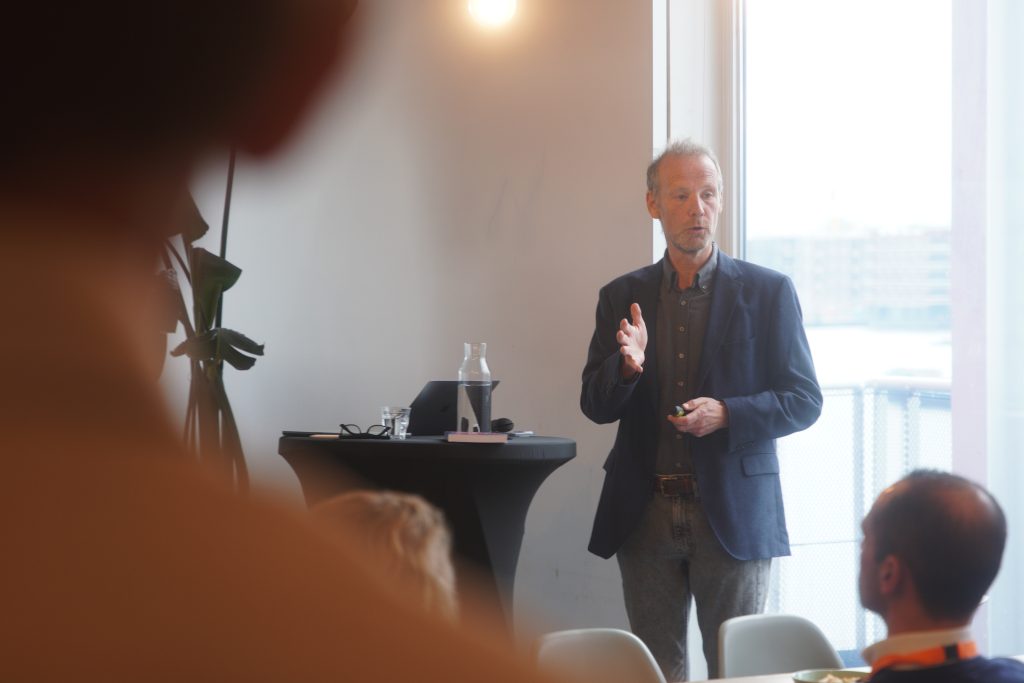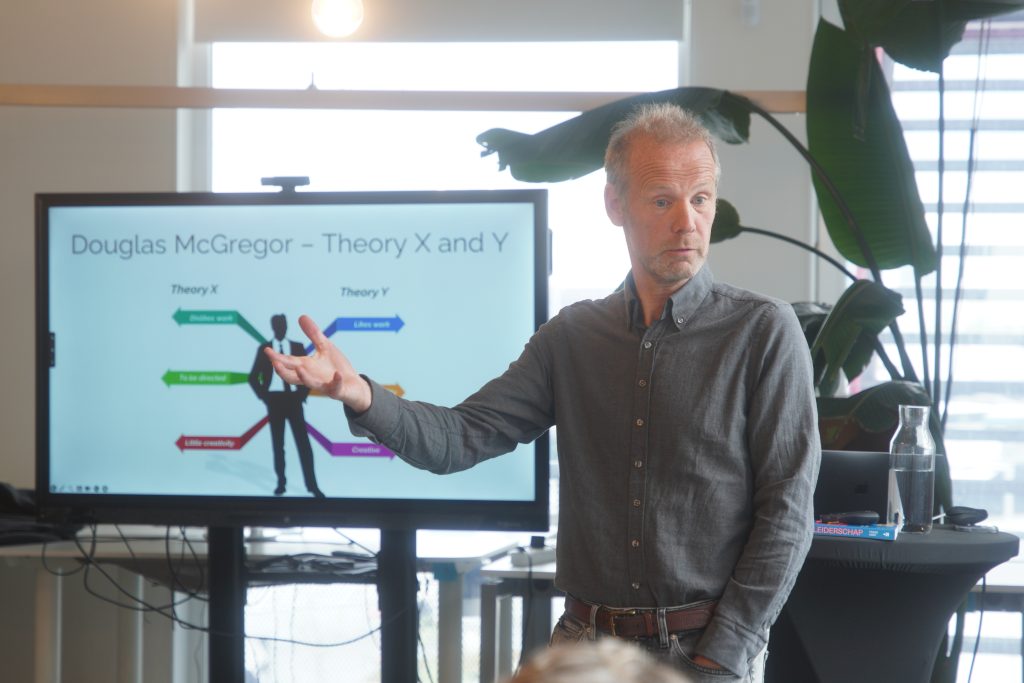Navigating The Present and Shaping The Future with Frank Vogt Recap
16 April 2024
We live in an incredibly exciting era of digitization and a rapidly changing world. The reality is that we are in a market where technology has an ever-increasing impact. Does this offer opportunities? Absolutely. But we must also not ignore the threats. How do you smoothly navigate your organization in this current time? What is your plan? How do we develop as leaders within these developments? And what qualities will be distinctive? The crucial question is: what kind of leadership do we need to add to make it work?
With his book ‘DNA of Leadership,’ CIO/COO Frank Vogt took us through his conversations with prominent digital leaders. He combined insights from these dialogues with his own experiences and conducted extensive research, resulting in five characteristics of effective leadership. Just as DNA makes each person unique, it also uniquely characterizes every leader.
The Five Characteristics of Leadership
At the REM-eiland, Frank asked the guests to vote on one of the five crucial characteristics for effective leadership and to choose an image they believed best represented leadership.
- Self-awareness – Recognizing and harnessing your unique qualities.
- Context – Creating the right circumstances.
- Trust – Beginning with a positive view of humanity.
- Guide – Steering towards a meaningful future.
- Expedition – Shaping your own leadership journey.
Trust was quickly recognized as a key leadership trait. A man from the audience shared his experiences with organizations that are heavily control-oriented and where a lack of trust often leads to issues. He spoke about individuals who try to solve everything themselves, which often results in burnouts. He noted how challenging it can be to assist these individuals, especially when, despite the guidance provided, they still take all the responsibility upon themselves.
Frank took this opportunity to emphasize the qualities needed to effectively deploy trust and asked who should take responsibility for development: the leader or the individual themselves?
Transferring trust
In response, Frank shared an anecdote from Huub Vermeulen, the then CEO of Bol.com, who during the COVID-19 crisis demonstrated how essential trust is for effective leadership. When the pandemic led to the closure of all physical stores and online sales skyrocketed, the company came under immense pressure. In this chaotic period, employees, fearful and uncertain, asked Huub what they should do. His answer was simple yet powerful: “I trust that you will make the right choices.” With this, he did not give direct orders but chose not to seize control. He advised his team to first think about their own well-being and that of their families, then about the team, and finally about the company. When Frank asked him about the origins of this approach, Huub explained that his leadership style was shaped by how he was raised—his father had taught him to take responsibility without imposed rules, trusting that he would make the right choices. The dialogue about trust then moved on to the topic of self-management within organizations, where an audience member raised an important point.
‘’Trust is crucial, but you also need to give people room to develop, so that unrealistic expectations don’t arise,” says Frank Vogt.
Self-management within organizations
He recently left a company where self-management was implemented without clear direction. “Without direction, self-management isn’t real management; everyone just does whatever they want, without the confidence that they’re doing the right things,” he explained. Frank chimed in, emphasizing that successful self-management relies on a clear framework within the organization. “The difference between success and failure lies in providing clear direction and the trust employees need to make the right decisions,” he said. He added that it’s a challenge to determine which rules are necessary and which are redundant, in order to strike a balance that encourages both autonomy and responsibility.

Frank went on to discuss a theory by Douglas McGregor about organizational attitudes toward employees, known as Theory X and Theory Y. According to Theory X, leaders believe that employees naturally dislike their work and require constant direction and control, while Theory Y suggests that people enjoy their work and are creative and responsible. “Both views are valid and shape how an organization is managed; some organizations opt for strict rules and KPIs, while others provide more freedom,” he explained. He emphasized the importance for leaders to critically examine existing rules and consider adjusting or removing them to prevent employees from losing their own sense of responsibility and initiative.
Growth vs Fixed mindset
Frank asked the audience for their thoughts on the application of a ‘growth mindset’ versus a ‘fixed mindset’. A man from the audience responded: “For example, look at artificial intelligence and the future of leadership. When you apply the principles of the growth mindset and the fixed mindset, you see that AI is an algorithm that learns from another algorithm. If you place this in the context of leadership, what kind of mindset does AI have?”

Frank responded thoughtfully to the question from the audience: “Good angle. Who do you think is faster, us or AI?” One attendee speculated that AI inherently has a ‘growth mindset’, which could lead to tremendous progress. The discussion expanded with the assertion that no one absorbs information as quickly as AI, especially not with the pace of current developments. Doubts arose among the audience as to whether AI truly learns or merely gathers existing information. “I think it can make new connections and come up with something new,” suggested another. Frank affirmed, “AI will undoubtedly learn faster than us, and many traditional management tasks will quickly become outdated.” A visitor questioned whether AI could truly innovate like the transition from horses to cars. While some believed AI could innovate within existing paradigms, others remained skeptical and fearful, concerned about the unpredictable paths AI could take. Frank highlighted how important it is to be mindful of the mindset with which we feed technology: “Opinions about AI and its developments vary greatly; the more negativity we put into it, the more negativity we get back, and vice versa with positivity.”
Trust is a feeling that can deeply resonate and according to him, cannot be replaced. He refers to education, where teachers and students often engage in a kind of cat-and-mouse game. And teachers find it difficult to determine whether an assignment has been written by ChatGPT or if the student has actually delved into the subject. However, by personally discussing with the student and asking direct questions about the content, the teacher can quickly uncover the true nature of the student’s effort. According to Vogt, this is likely the future direction of human knowledge: the integration of technology and the enhancement of personal interaction, with the latter remaining essential for education and understanding.
Conclusion
In his closing remarks, Frank emphasized the importance of self-awareness and authenticity in leadership. He encouraged attendees to focus on their strengths and the things only they can do, letting go of the rest. This enables teams to carry out their tasks independently, not only promoting their autonomy but also sharpening the leader’s mind. Frank emphasized the importance of creating a motivating environment where people feel connected to the company, which is essential for effective guidance and navigating the organization in the right direction. He reflected on the human aspects of leadership, such as the ability to show compassion and understand how someone can be supported, something he believes artificial intelligence will never be able to replace. Lastly, he urged leaders to cultivate self-awareness and wisdom, and to be tough on themselves in determining what they can and cannot influence, in order to remain as sharp and effective as possible in leading their organizations.
Ook Feeling the need for in-depth discussion on a topic close to your heart? We organize monthly Executive Connects for organizations and Freelance Connecting Fridays for interim professionals. At the REM-eiland, you dive deep into current topics with like-minded individuals.
Check out the events page for the next Connect’s

 Back
Back